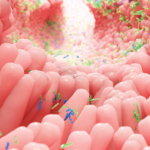Microbial Gardening
Bacteria help trigger urinary tract and other vaginal infections in women, said Gregor Reid, PhD, MBA, a professor of microbiology and immunology at the University of Western Ontario in London. After delivering a baby, mothers may have a sharp drop in levels of protective lactobacillus, he said.
Probiotic yogurt does not affect the vaginal flora when eaten, but it does help when used intravaginally, said Dr. Reid. Unlike the gut, the vagina’s microbial garden can be changed. “We have never thought of giving probiotics after delivery, but maybe we should. It would help her recover quicker,” he said. Probiotic lactobacillus may also help postmenopausal women prevent urinary tract infections, he added.
Ingested lactobacillus does help manipulate the antimicrobial defenses in the gut and can modulate immunity, said Dr. Reid. Probiotic yogurt may help prevent deadly, bacterial infections causing diarrhea in people living in developing regions like East Africa.
Fecal Transplants
Replacing harmful bacteria in the colon of sick patients with bacteria from healthy individuals has shown rapid, beneficial results, said Michael J. Sadowsky, PhD, director of the Biotechnology Institute at the University of Minnesota in St. Paul.

Many patients with C. difficile infection are prone to recurrence that doubles with each bounceback, Dr. Sadowsky said. Traditional treatments include specific antibiotics or tapered antibiotic therapy, but this is ineffective in many cases. Bacteriotherapy, or fecal microbiota transplantation (FMT) using a full-spectrum of fecal bacteria, is a new, more effective approach, he said.
Fecal bacteria donors go through rigorous, extensive screening. They must be adults who have had no recent antibiotics, no gastrointestinal ailments and no acute viral infections, Dr. Sadowsky said. Transplants are in frozen, standardized microbiota preparations and have no odor.
In an early trial, 11 of 12 patients with recurrent, antibiotic-resistant C. difficile infections improved within days after FMT, said Dr. Sadowsky. Now they have treated many hundreds. Only a few patients needed an additional treatment. Using endoscopy, the proximal colons of recipients appeared healthy and their microbial composition started to look like the donor’s, he said. Primary bile acid composition in the gut was lower after transplant, creating a less permissive environment for germination of C. difficile spores.
“You don’t even need high-tech imagery, because the patients themselves report relief within two days of receiving the material,” he said. Oral capsules may one day replace more expensive, invasive endoscopy delivery of the transplant, he added.


